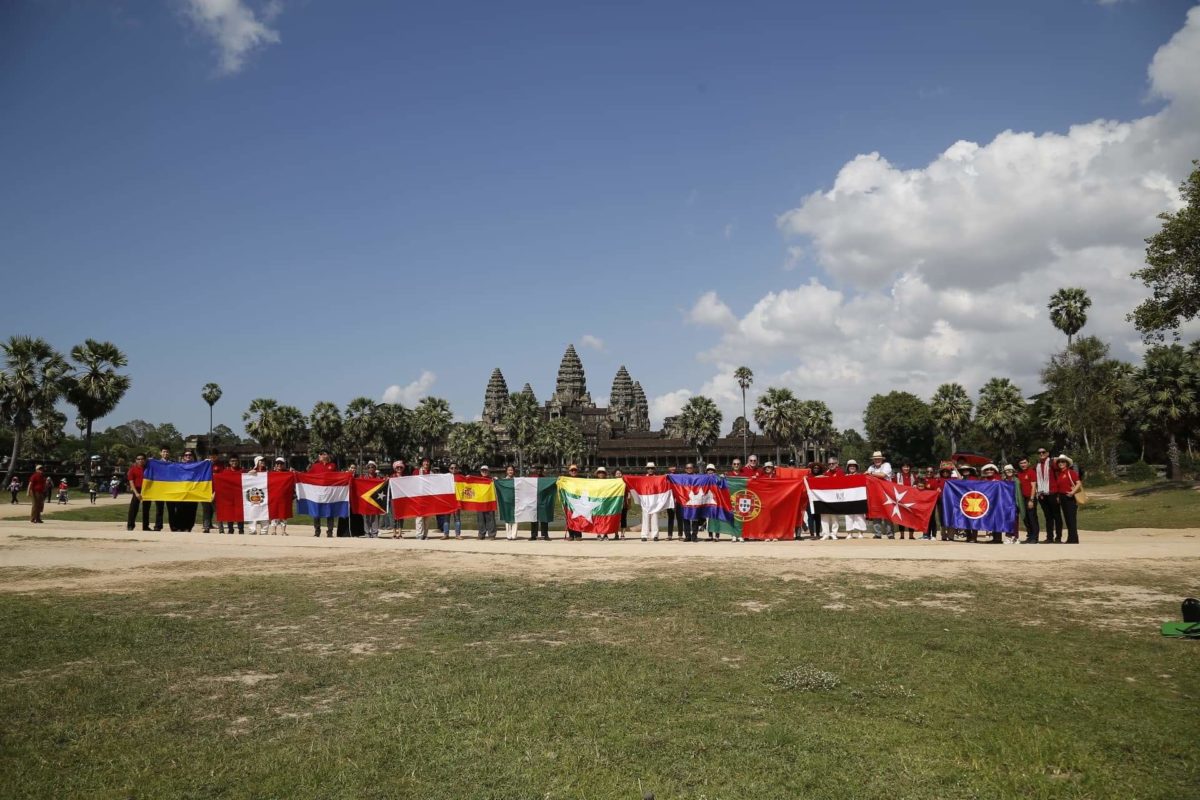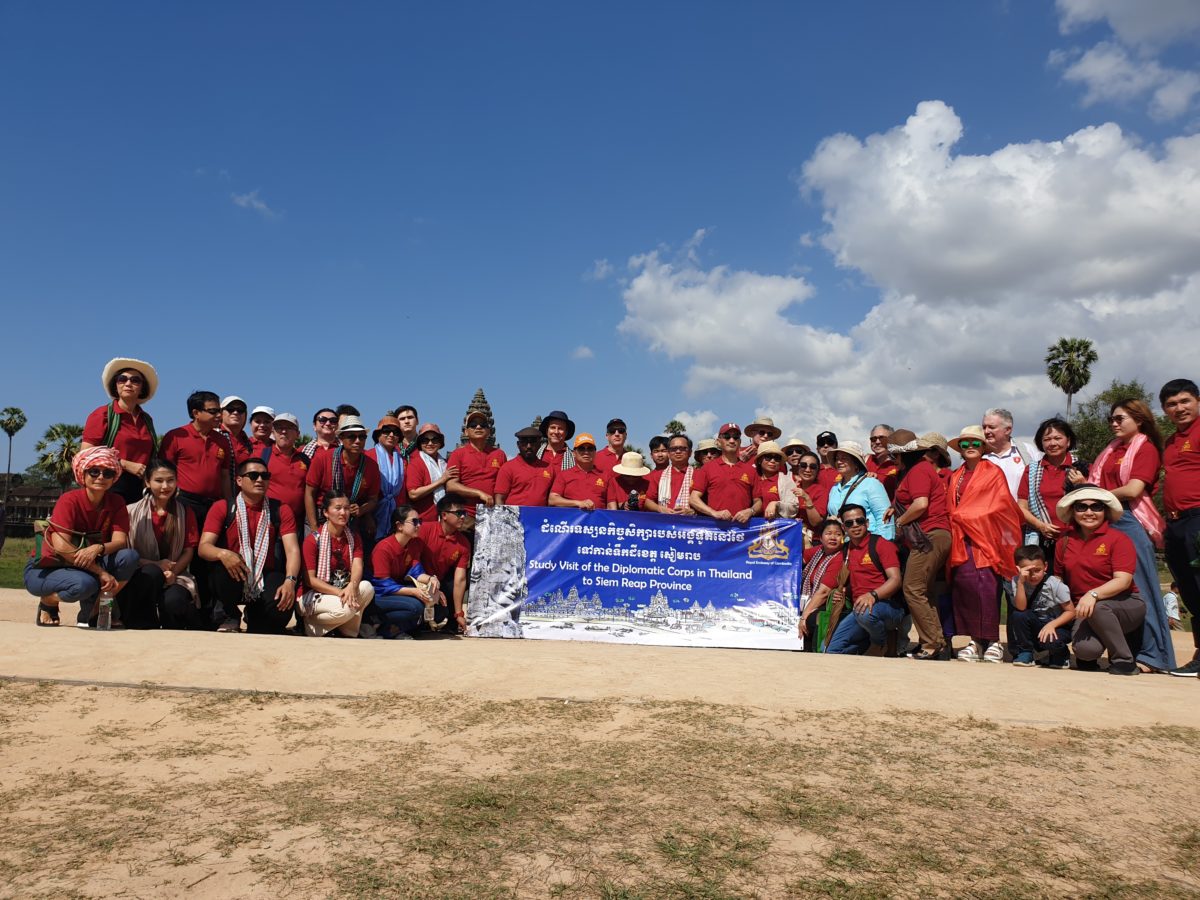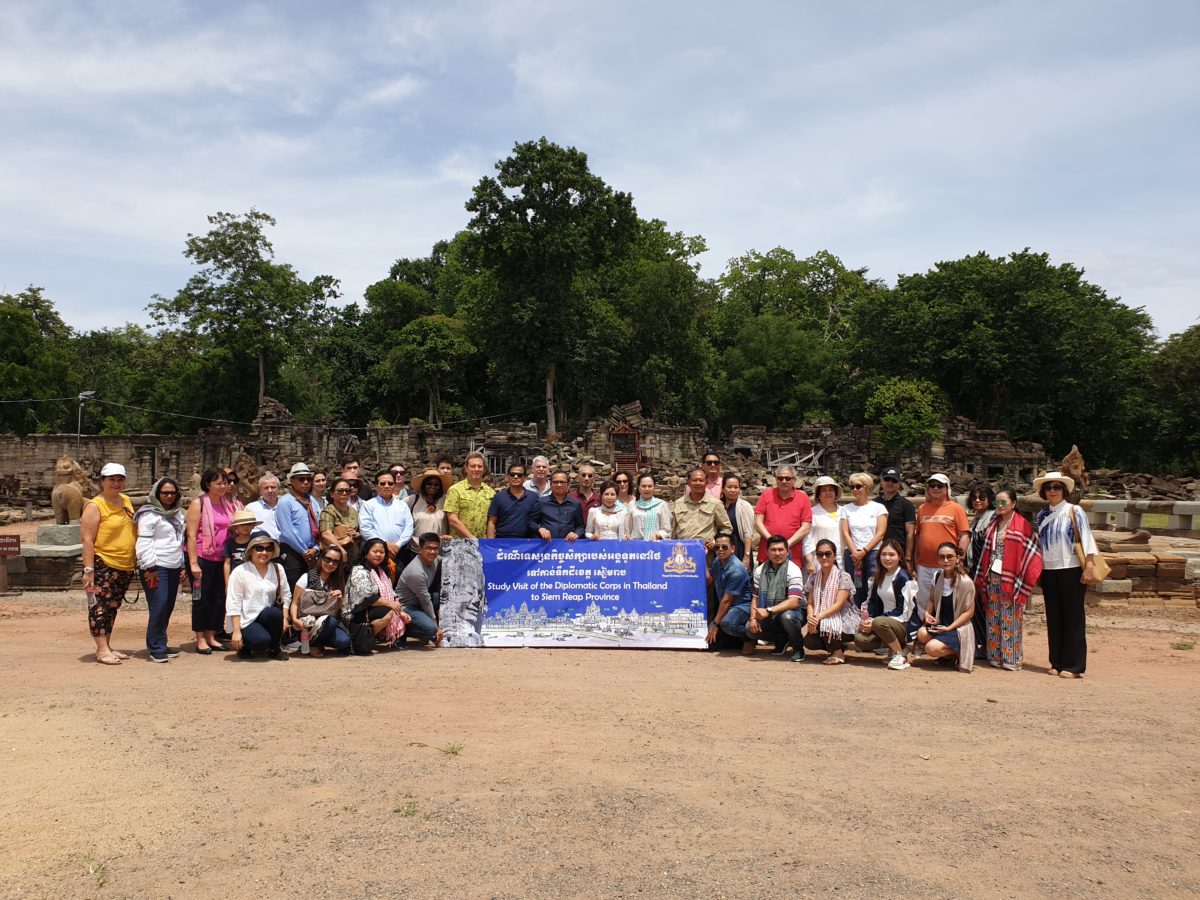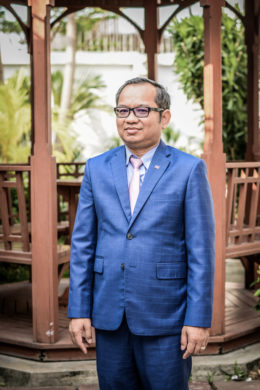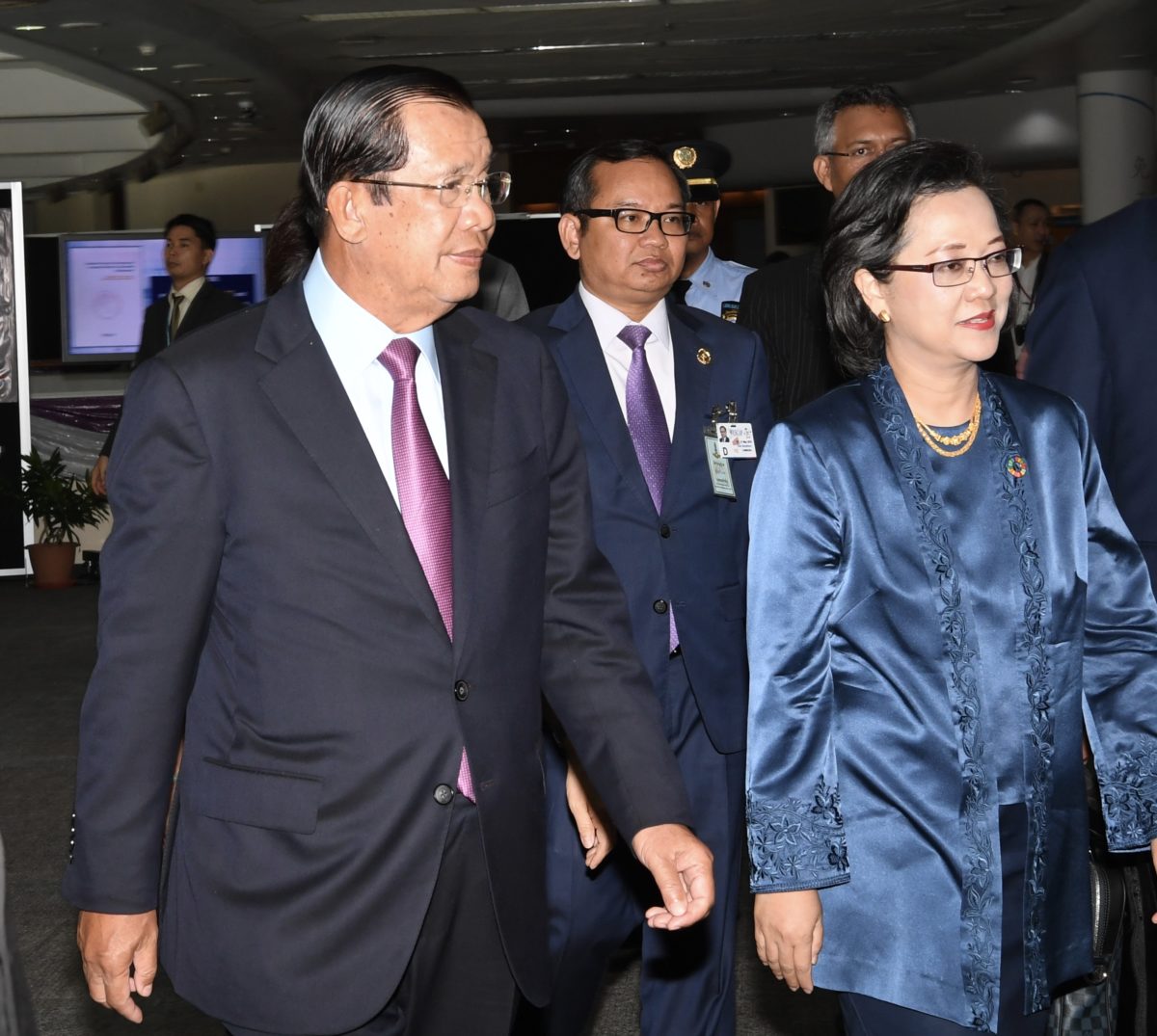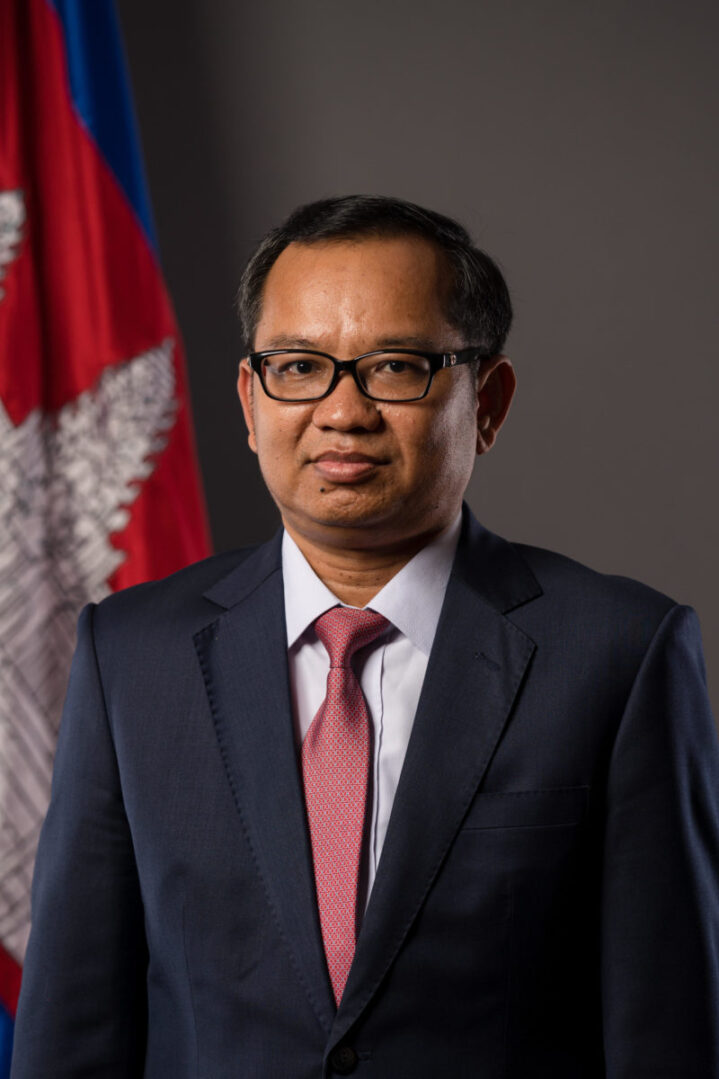
Meet the Cambodian Ambassador H.E. Ambassador Mr. Sorphorn Ouk
Cambodia, officially the Kingdom of Cambodia, is a country located in the southern portion of the Indochina peninsula in SE Asia. It is 181,035 square kilometres (69,898 square miles) in area, bordered by Thailand to the Northwest, Laos to the Northeast, Vietnam to the East and the Gulf of Thailand to the Southwest.
The sovereign state of Cambodia has a population of over 15 million citizens. The official religion is Theravada Buddhism, practised by approximately 95% of the population. Cambodia’s minority groups include Vietnamese, Chinese, Chams and 30 hill tribes.
The capital and largest city is Phnom Penh, the political, economic and cultural centre of Cambodia. The kingdom is an elective constitutional monarchy with a monarch, currently Norodom Sihamoni, chosen by the Royal Council of the Throne as the head of state. The head of government is the Prime Minister, currently Hun Sen, the longest serving non-royal leader in SE Asia, ruling Cambodia since 1985.
In 802 AD, Jayavarman II declared himself King, uniting the warring Khmer princes of Chenla under the name “Kambuja”. This marked the beginning of the Khmer Empire, which flourished for over 600 years, allowing successive kings to control and exert influence over much of SE Asia and accumulate immense power and wealth. The Indianised kingdom facilitated the spread of first Hinduism and then Buddhism to much of SE Asia and undertook many religious infrastructural projects throughout the region, including the construction of more than 1,000 temples and monuments in Angkor alone. Angkor Wat is the most famous of these structures and is designated as a World Heritage Site.
After the fall of Angkor to Ayutthaya in the 15th Century, a reduced and weakened Cambodia was then ruled as a vassal state by its neighbours. In 1863, Cambodia became a protectorate of France, which doubled the size of the country by reclaiming the North and West from Thailand.
Cambodia gained independence in 1953. The Vietnam War extended into the country in 1965 with the expansion of the Ho Chi Minh Trail and establishment of the Sihanouk Trail. This led to the US bombing of Cambodia from 1969 until 1973. Following the Cambodian coup of 1970 which installed the right-wing pro-US Khmer Republic, the deposed King Sihanouk gave his support to his former enemies, the Khmer Rouge. With the support of the monarchy and North Vietnam, the Khmer Rouge emerged as a major power, taking Phnom Penh in 1975. The Khmer Rouge then carried out the Cambodian genocide from 1975 until 1979, when they were ousted by Vietnam and the Vietnamese -backed People’s Republic of Kampuchea, supported by the Soviet Union, in the Cambodian – Vietnamese War.
Following the 1991 Paris Peace Accords, Cambodia was governed briefly by a United Nations mission (1992–93). The UN withdrew after holding elections in which around 90% of the registered voters cast ballots. The 1997 factional fighting resulted in the ousting of the government by Prime Minister Hun Sen and the Cambodian People’s Party, who remain in power as of March 2020.
Cambodia is a member of the United Nations since 1955, ASEAN, the East Asia Summit, the WTO, the Non-Aligned Movement and La Francophonie. According to several foreign organisations, the country has widespread poverty, pervasive corruption, lack of political freedoms, low human development and a high rate of hunger. Cambodia has been described by Human Rights Watch‘s SE Asian Director, David Roberts, as a “relatively authoritarian coalition via a superficial democracy”. Constitutionally a multi-party liberal democracy, the country is effectively governed under one-party rule as of 2018.
While per capita income remains low compared to most neighbouring countries, Cambodia has one of the fastest growing economies in Asia, with growth averaging 7.6% over the last decade. Agriculture remains the dominant economic sector, with strong growth in textiles, construction, garments and tourism leading to increased foreign investment and international trade. The United Nations designates Cambodia as a least developed country. The US World Justice Project‘s 2015 Rule of Law Index ranked Cambodia 125th out of 126 countries, far lower compared to other countries in the region.
Expat Life was pleased to sit down with H.E. Ambassador Mr. Sorphorn Ouk and ask him about what the new Cambodia is all about.
Despite being neighbours for over 1,000 years, it was somewhat surprising to learn that Thailand and Cambodia have only had diplomatic relations since 1950. For two countries that have such ancient histories, 70 years is but the blink of an eye. 2020 marks the 70th anniversary of diplomacy between these two SE Asian kingdoms and H.E. Ambassador Mr. Sorphorn Ouk has assured that there is so much to look forward to.
Sorphorn was born just a week before the Khmer Rouge came into power in 1975. Though he was just a baby during the Cambodian genocide which took the lives of nearly 25% of Cambodia’s population, he grew up in the unstable aftermath of the tyrannical regime. In spite of the darkness and war, Sorphorn drew inspiration from the resilience of Cambodian people and has dedicated his life’s work to helping his countrymen realise a better future. “Peace has been hard-earned in my homeland and my government has pledged to maintain this peace so that Cambodia may attain her full potential.”
After earning his Associate’s degree, he began work in the Cambodian Ministry of Foreign Affairs, quickly moving into leadership positions domestically and within ASEAN. In 2001, Sorphorn went back to school to earn his Bachelor’s Degree in General Management while simultaneously working various jobs within ASEAN. Interestingly, his current Ambassadorship is not his first long stay in Thailand. In 2008, he attended Ramkhamhaeng University in Bangkok for his Master’s in Political Science and completed his thesis on the Future Direction of ASEAN. “I have many friends in Thailand and when I returned to serve as Ambassador last year, it felt like I was coming home.” His years of public service, continuing education and direct exposure to Thailand made him a unique fit to assume the Ambassadorship position in April of 2019. As he nears his one-year mark, he has already accomplished a great deal and he outlined the major focuses that he has for the duration of his appointment, all of which are centered around strengthening Thai-Cambodian relations.
One of Sorphorn’s biggest focuses is on people and how Thais and Cambodians can work together for mutual benefit. He sees a lot of similarities between Thailand and Cambodia: both are kingdoms, both are primarily Buddhist with rich histories and traditions, the food is quite similar and both cultures see the power in a good smile with a polite wai.
Luckily, Thailand has not experienced the bloodshed and hardship that Sorphorn’s own people have endured. However, Thailand has opened their homeland for Cambodians to work and live. There are nearly 1.2 million Cambodians in Thailand. They are mostly employees, labourers, students and monks. As Ambassador, it’s Sorphorn’s responsibility to look after their wellbeing and he takes this duty quite seriously. He travels around Thailand (he has visited 30 plus provinces already) meeting Cambodians and talking with them about the importance of having the correct paperwork so they can legally work and reside in their adoptive home. He believes legal compliance is so important that he physically goes to meet with workers who need assistance and sometimes spends hours in Cambodian communities just for photo opportunities. He aims to provide better services to all Cambodians living and working in Thailand.
In terms of commerce, his focus is largely in two areas: border trade/transportation and investment. Thailand sells fuel, petroleum oils, machinery, electric parts, construction materials, consumer products and industrial products to Cambodia. Cambodia sells agricultural products such as corn, soybean, maize and cassava, ignition wiring sets and scrap gold to Thailand. In the past, there were long lines at the borders which impeded trade. On the Cambodian side, he has worked to better organise traffic and improve the roads in order to cut down on these literal roadblocks to trade. Not only is he promoting overland transport improvements to increase trade, he’s hoping that this will encourage more people to come to Cambodia by bus so that they can see the landscape and what Cambodian people are all about. He wants more Thai people to familiarise themselves with their neighbour as Thais are currently the number three nationality for entries to Cambodia. It’s just a three-hour drive to the border from Bangkok and another three to Siem Reap.
A major infrastructure project will be competed in 2020: the Cambodia-Thailand Friendship Bridge with customs offices on both sides. In addition to the new bridge, in April of 2019, the handover ceremony of the four Diesel Multiple Units (DMU) or train heads was held. Both the rail and bridge links are sure to improve trade routes between the kingdoms. On top of these major infrastructure projects, there are 19 border checkpoints with 12 international checkpoints. He hopes to add another 4 international points during his tenure to provide more gateways for international travel and trade.
Cambodia is ripe for investment. As the country has been at peace for more than 20 years now, they have demonstrated that they are dedicated to stability and growth. The GDP has grown six-fold in this time period from US$3.1 billion to US$24.4 billion. With the opening of the new international checkpoints, he anticipates even greater trade growth.
One of the best reasons to invest in Cambodia is they waive taxes for the first nine years. Coupled with an inexpensive labour force and steady growth, this makes it quite an attractive place to invest. There are already more than 1,000 Thai companies registered with the Ministry of Commerce in Cambodia including some major players like CP All Public Co., BJC Big C Group, Makro and Siam Cement Group. For anyone looking to invest in Cambodia, the Ambassador suggests construction, tourism, real estate and agriculture. In response to this economic growth, the Cambodian government is seeking to open embassies in new countries so that they aren’t reliant only on their current partners.
While tourism isn’t one of the top earners for Cambodia, Sorphorn sees it as an area that should not be neglected. They currently earn about US$4.35 billion from tourism, which is nothing to scoff at. As the home of Angkor Wat, one of the most incredible ancient sites in the world, Cambodia definitely has a gem to entice people to come visit. Besides Angkor Wat, Phnom Penh has an impressive Royal Palace and National Museum that is frequented by an increasing number of travellers.
Cambodia also has beaches and islands that haven’t yet experienced the development boom that their neighbouring countries have so they are still somewhat . With something for everyone plus a friendly population, great food and inexpensive prices, Cambodia is set up to be a major player in the tourism arena.
So, what does the Ambassador see for the future of his beloved Cambodia? With all the attention toward development, investment and people, Cambodia has already proven its dedication to improving the lives of its people. According to the World Bank, Cambodia’s status changed from a less-developed country to a lower-middle income country in 2015. The poverty rate has dropped from 53% (in 2004) to 10% (in 2018). As a countrywide goal, Cambodia is aiming toward transforming into an upper-middle income country by 2030 and a high-income country by 2050. This clearly presents a good opportunity for international investors and Cambodians alike.
After all the time he has spent here, Sorphorn feels like Thailand is home away from home. In his current position he will be here for another three or four years. The food and the shopping make it an enjoyable place for him and his family. In coming years, there is a lot to look forward to for the continued positive relationship between these brother kingdoms.
“The Embassy of Cambodia in Thailand is preparing a number of activities to mark our 70th year of official friendship, in the spirit that what we have in common has united us since time immemorial. May we record another 70 years of prosperity in peace and may we live on as an example to our brothers and sisters in the broader ASEAN community.”



